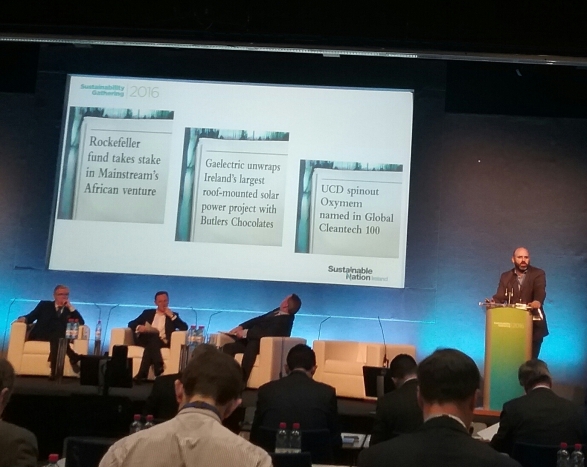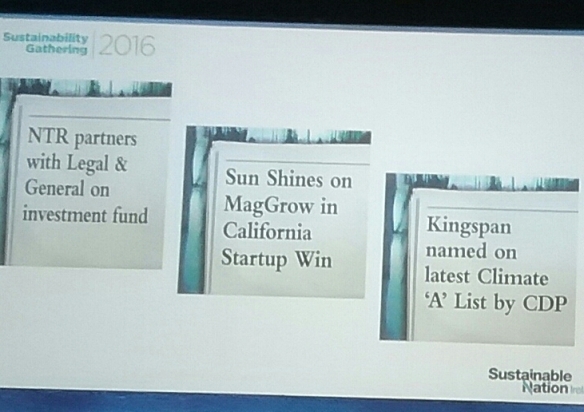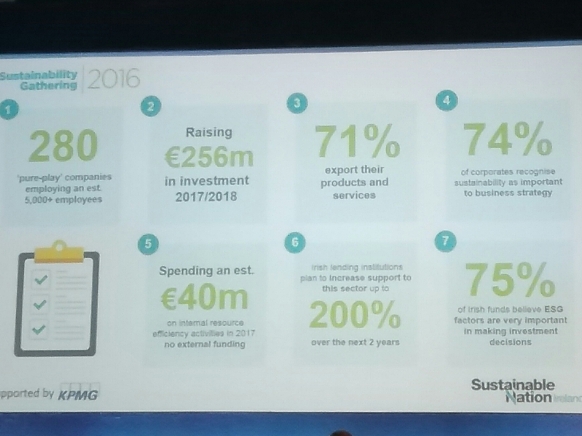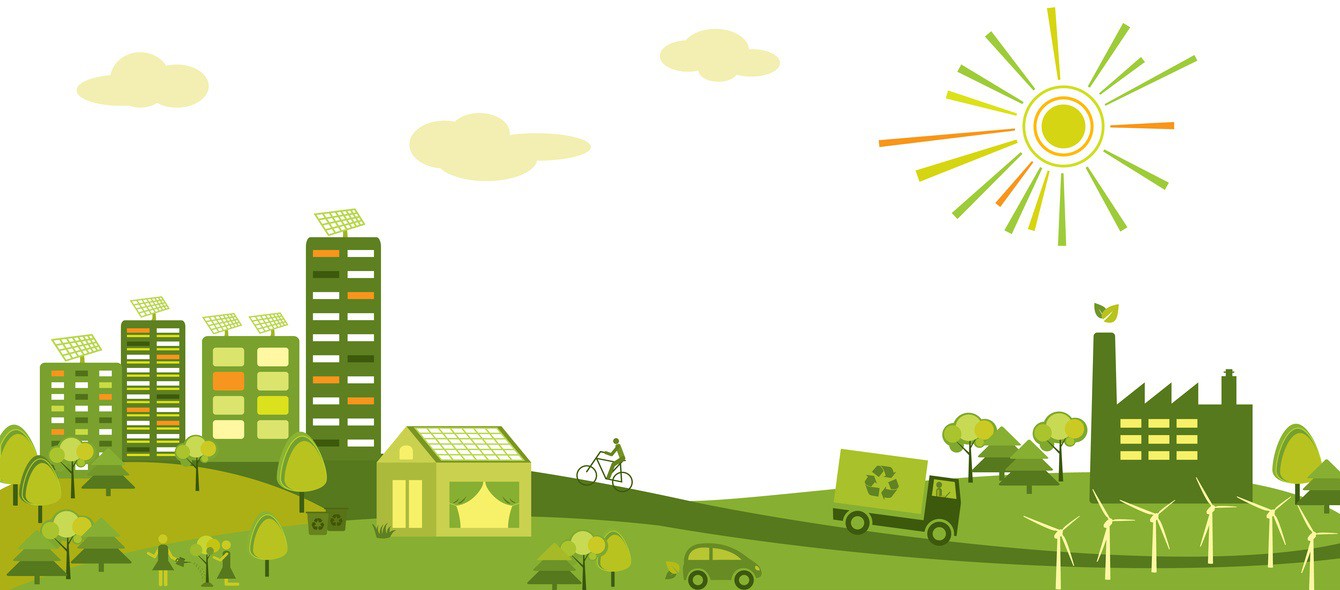On Tuesday Sustainable Nation Ireland (http://sustainablenation.ie/) held the Sustainability Gathering, a one-day event in Dublin Castle bringing together industry and policy-makers and consisting of back-to-back panel discussions on business, investment and policy for sustainability. The event blurb stated that it was aimed to “discuss and showcase the many ways that Irish businesses can grab a share of the estimated €85 trillion which will be invested in global sustainability and resource efficiency by 2030″.
Four panels were held, bookended by an introduction and wrap-up. Stephen Nolan, CEO of Sustainable Nation Ireland, introduced the Gathering, observing that he hoped the day would provide some insight on how corporate Ireland can work with government to “show government the opportunities in this space”. He opened with some examples of Irish corporate engagement with sustainability:


He also highlighted the findings below from a recent KPMG survey that illustrates that 74% of Irish companies “recognise sustainability as important to business strategy”.
 .
.
The next introductory speakers were Pat Cox, Chairman of the Sustainability Gathering and former President of the European Parliament, and John Mullins, Chairman of Sustainable Nation Ireland, who briefly discussed sustainability at a policy level. Pat Cox suggested that the Irish government must set GHG emissions targets in every sector, and develop actionable sector-specific plans. He noted that emissions in all sectors are going up and that we need to be mindful of the EU’s increasingly ambitious targets. His recommendation was “policy innovation” and he suggested that the government needs to open conversations with a range of actors, for example, talk to taxi drivers about switching to electric vehicles. We need “dialogue focused on deliverables, not diagnosis”.
They also considered the impact of the political situation in the US post-Trump. Pat Cox noted that not all industries in the US are committed to sustainability e.g. the motor industry, while John Mullins warned that corporate America will continue to lobby in its own interests.
This discussion was followed by four panels, all chaired by David Murphy of RTE. A brief summary of each panel follows below.
Panel 1: Providing a supportive policy framework, an insight
Speakers:
• Eamonn Confrey, Principal Officer Decarbonisation Unit, D/Communications,
Climate Action & the Environment
• Des O’Leary, Principal Officer Climate Finance, D/Finance
• Dr. John O’Neill, Principal Officer Climate Policy, D/Communications,
Climate Action & the Environment
• Declan Hughes, Assistant Secretary General Action Plan for Jobs,
D/Jobs, Enterprise & Innovation
This discussion featured four policymakers from three different governmental departments, and offered a fascinating insight into the government view on private and public sector collaboration.
Eamonn Confrey discussed electric vehicles, and suggested that the public sector can be an early adopter. He also noted the importance of giving certainty to investors, a theme that was picked up by a number of speakers during the morning.
Des O’Leary suggested that the private sector was a crucial driver of renewable energy, and John O’Neill agreed that government would like to engage more with the private sector. John drew our attention to the national climate change mitigation plan, which will be published for consultation in next few weeks. He suggested that climate policy is currently top-down, and that more engagement is needed at a regional level. He also suggested that innovation is required on adaptation as well as mitigation, noting that a new national adaptation plan will be published mid-2017.
Declan Hughes spoke of productivity, sustainability and resilience in agriculture and highlighted the role of ag. tech and ag. machinery. He noted that the industry is aiming for an increase in output with a decrease in input. He also stressed that the delivery of policies requires “ownership at a local level”, referring to the case of the proposed Apple data centre in Athenry (latest news here).
When it came to the audience Q&A environmental campaigner Duncan Stewart (of RTE’s Eco-Eye) said he was disappointed with the level of the discussion and suggested that there was no leadership coming from government, just “lack of action and lack of joined-up thinking”. He called for the establishement of a “high price on fossil fuels”. The panel responded that this would result in competitiveness issues for Ireland, and burden sharing in terms of tax. John O’Neill suggested that taxation is only one small element of policies that need to be changed and promised a range of issues in the forthcoming mitigation plan.
Panel 2: Mobilising Finance for a Sustainable, Low Carbon Economy
Speakers:
• Colin Hunt, Managing Director Wholesale & Institutional Banking, AIB
• Peter Cripps, Editor-in-Chief, Environmental Finance
• Helena Anderson, Head of Capital Investment, UK Department of
Trade & Investment
• Manus O’Donnell, CIO NTR Plc
The second panel focused on investment for sustainability, with insight on both lending to businesses and large-scale insitutional investment.
Peter Cripps suggested that investors are now relatively confident when it comes to solar and wind energy, and emphasised that it is “crucial to get institutional investors on board”. He has observed an increase in demand for more data from investors such as carbon footprinting for companies, and also a push back on carbon footprinting not being enough. Peter discussed the upcoming FSB guidance on climate-related risk (due on 14th December from the TCFD) and suggested that investors are concerned about the risk of overvaluation of fossil fuel-related assets, a point Manus O’Donnell also echoed. Peter Cripp also noted that new legislation in France on ESG reporting will come into effect next year (see here for info). He also drew our attention to the work of the Grantham Research Institute on carbon budgets (http://www.lse.ac.uk/GranthamInstitute/publications/).
Peter identified a number of trends related to sustainability and green investment:
- Shareholder action becoming more common, as in the case of a number of mining companies
- Green bond market – this is still tiny but has seen an explosion of interest. He highlighted Irish company Gaelectric as one to watch in this area.
- Companies now reporting carbon emissions. Here he referred to the recent Carbon Disclosure Project report on Irish companies.
Later in the discussion, he proposed a couple of policy directions for Ireland. The first was the PACE housing scheme in the US, where energy efficiency upgrades are made to homes but the debt is attached to the home rather than the owner. Second was a Green Investment Bank as in the UK, which he suggests can help to make investors more comfortable with the riskiest stages of investment.
Helena Anderson gave us the UK perspective, arguing that Brexit will not effect the UK government’s investment in green finance. She suggested that institutional investors such as pension funds and insurance companies are becoming more comfortable with risk, and cautioned that “huge amounts of public funding crowd out the private sector”.
Colin Hunt of AIB noted that there is a capital gap in the early, more risky part of funding. He suggested that “financial innovation” is required. From his perspective it is government, not business that needs to be convinced to invest in sustainability, and he urged government to provide the regulatory framework. He highlighted this open letter from US companies to Donald Trump. He closed with the point that talk of a “Green IFSC (Irish Financial Services Centre) lacks credibility when Ireland is failing to meet its EU climate targets. In his view “we have a mountain to climb”.
Panel 3: Enterprise led, Solutions driven
Speakers:
• Jim Fitzharris, Group Secretary, Smurfit Kappa Group
• Tom Mitchell, Head of Ireland-U.K. (EU’s largest climate tech platform)
• Ronan Furlong, CEO Alpha Innovation, DCU
• Tom Mitchell, Director UK and Ireland, Climate-KIC
• Christine Boyle, CEO, Senergy Innovations
• Seemab Sheikh – Deputy Head of Mission, Embassy of Denmark in Ireland
Jim Fitzharris gave us an introduction to sustainability reporting at Smurfit Kappa, observing that the only way you know what you’re doing is to manage and report on it. He also said that he would like to corporate Ireland “upset the applecart” and really push renewable energy.
Seemab Sheik gave a fascinating insight into Danish economic and environmental policy. She said that their approach to sustainability began during the 1970s oil crisis, when they realised they could not be dependent on imported fuel. Denmark is now branded as “State of Green” and she explained that this branding allows them to bring all actors together. When asked later in the Q&A how government reacts if industry responds to new policies with “no, that’s too expensive”, she indicated that they simply explain to industry that they will lose out if they don’t adjust.

Denmarks’ State of Green branding image
Tom Mitchell discussed the various initiatives Climate-KIC plans to bring to Ireland, including a green entrepreneurship education platform. He suggested that more regulation increases innovation, citing the EU emissions trading scheme as an example
Christine Boyle told the story of her company Senergy, which aims to provide low cost solar energy, giving an insight into the challenges of starting and growing a renewable energy business. Support is available from sources like DCU’s Alpha Innovation, which, as Ronan Furlong explained, has helped organisations such as Exergen get valuable EU funding. Ronan also observed that he is now seeing innovation at business process level as well as a technological level.
A brief interlude after the panel was the presentation of the Sustainable Business Leadership Award 2016 to Sean O’Driscoll, President of Glen Dimplex. In his short speech he suggested that energy efficiency and renewable energy must be developed in tandem. He called for the electricification of heat and transport and clear policies and strong regulations to make this happen. He indicated the the primary energy factor for electricity must be revised, as it is currently at a disadvantage compared to fossil fuels.
Panel 4: Positioned to Lead, Ireland’s opportunity
Speakers:
• Sean O’Driscoll, President Glen Dimplex
• Diarmaid Ferriter, Professor of Modern History UCD
• Sean Kidney, CEO Climate Bonds Initiative
• Fergal Leamy, CEO Coillte
In the final panel Diarmuid Ferriter spoke of the new political challenges presented by 2016. He observed that politics now faces many new and modern challenges such as climate change. He suggested that Ireland must champion a green agenda and push it to the best of our ability internationally, in a variety of different international fora. He also argued that climate change education should be compulsory in schools and that society must “get our heads around” the idea of climate-related taxes. Asked about the US situation, he commented that in Ireland we get an “east coast, liberal view” on the US; we don’t hear much about the “spectacular inequality” in the country (see the Guardian’s Anywhere but Washington series for some indication).
Continuing the US theme, Sean O’Driscoll suggested that the US will ignore the Paris climate change agreement and that “China will use it to get one up on the US”. He referred to the problem of “trapped assets in developed countries that industries will want to protect”, not such an issue in developing countries. On Brexit, he drew our attention to this ESRI report on the sector and product-specific impacts on Ireland.
Fergal Leamy discussed renewable energy, suggesting that it can be one of Ireland’s competitive advantages. However he also called for clearer policy, telling us that Coillte hesitated on investing in wind farms because of the lack of a planned policy framework.
The last word of the panel was left to Sean Kidney, from the NGO Climate Bonds Initiative. He began by outlining the reality of climate change, stating that “our future is currently unbelievably grim. 2degrees warming is the ambition. We are currently at 4degrees”. His advice was that “we need to bridge the gap between capital and deals”, suggesting that this is where financiers come in, and this is also where Ireland comes in with innovation. He also advised that the shift must be signaled from the top, at Prime Minister level.
The last speaker of the day was Jim Gannon, CEO of the Sustainable Energy Authority of Ireland (SEAI), who had some homework for the audience. He urged us to respond to public consultations on climate change action and to get our views across to policy makers:
“We need to lead by example. We all need to act and engage”.
